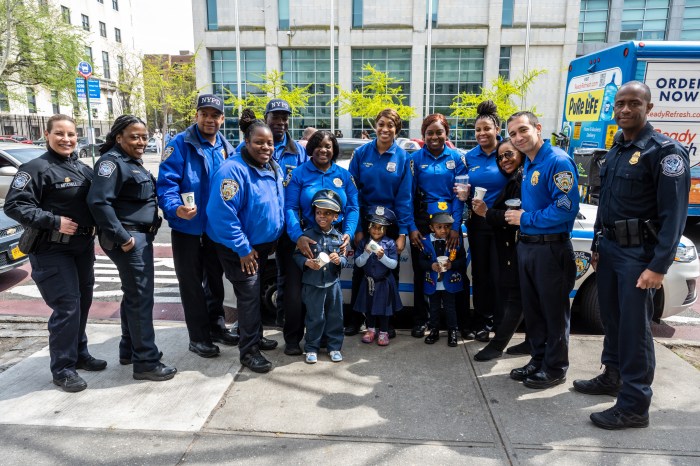CATHERINE M. LOZADA
If Governor David A. Paterson’s current proposed budget cuts are enacted, six senior centers will close in Queens, leaving stranded thousands of disappointed grandmas and grandpas.
Centers such as Forest Park in Woodhaven, Kew Gardens, SAGE/Queens in Jackson Heights, Korean-American in Flushing, Bell Park in Queens Village and LeFrak Senior Citizen Center in Corona will all shut down.
LeFrak executive director Victoria Williams said she wishes politicians saw her center as more than just free lunches because seniors have many other needs met also.
“As these people get older, their families aren’t around as much, and we provide a safe environment where they’ve grown comfortable,” Williams said. “A lot of these seniors might not leave their homes if not for this place. Human contact, support and someone to talk to go a long way.”
Kew Gardens and SAGE/Queens currently run on the bare minimum and depend entirely on volunteers. The City Council and the Borough President’s office help to keep them open since “they are closer to what the emerging community needs,” said Naomi Altman, associate executive director of Queens Community Houses, which heads both agencies.
Forest Park, opened 30 years ago, has lacked the contract with the Department for the Aging that most other senior centers have and had been told every year they would be shut down. However, it has become a home away from home for seniors who might not otherwise get dressed or leave their house, said executive director Donna Caltabiano.
“Anna [Luongo] wouldn’t be 95 without this place,” Caltabiano said about the senior who volunteers every day.
To survive, Forest Park cut its staff and shops for essentials at Costco.
The looming budget cuts have forced the centers not on the chopping block to also feel unsure about whether they can afford to stay open.
Executive director of Services Now for Adult Persons (SNAP) Linda Leest hopes the centers she heads in Rosedale, Belle Park and Jamaica will remain open. “The staff are all community people, and if we have to let them go, they won’t have money to spend in this community,” Leest said. “That would end up costing the city so much more.”
The director of Elmhurst-Jackson Heights Senior Center, Lucy Garcia, stays at work until 8 or 9 p.m., even though they close around 5 p.m. She feels they won’t shut down because they remain over utilized, but like the other centers, her center is still underfunded.
The more than 10,000 registered members – all who paid a one time contribution of $5 – come for two meals a day, billiards, stress therapy, exercise, bingo, card and domino games, English as a Second Language and naturalization courses offered in Spanish, Korean and Chinese, and calligraphy, sewing, dance, painting and computer classes. The center also has social workers on site.
Budget cuts would mean an additional 4.5 percent cut at Elmhurst, where over 500 seniors are served lunch at a site budgeted to only provide for 340.
An advocate for seniors, Maria Romero, 71, volunteers her time between the Elmhurst and Corona centers as an office aid, and went to Albany four times in March to rally on behalf of funding for senior centers. “We are in God’s hands and politicians,” said Romero. “I hope [Senator] Jose Peralta will help as he said he would. I told him not to forget us.”
State and City budget cuts target centers
The elderly may have become Albany’s newest targets.
To battle the state deficit, Governor David Paterson’s proposed budget could force up to 110 senior centers across the city to shut down, which would leave 5,500 seniors without a service center. At this time, New York City has the most extensive senior center network in the nation.
“The cuts for vital senior services already on the table from the Mayor’s budget are devastating to Queens – only to be outdone by the cuts that would be made if the Governor’s budget is enacted,” said Queens Borough President Helen Marshall.
According to Marshall, the borough’s more than 374,000 residents over the age of 60 would be devastated by these cuts. Six senior centers in Queens would close, in addition to four adult day care centers in Queens, vital transportation programs, a specialized program that helps seniors threatened with evictions and dozens of programs across the borough that provide daily programs in senior centers to home deliver hot meals to homebound, frail seniors.
“Surely, we owe more to our seniors than that,” said Marshall. “I don’t see how we can explain to a homebound senior that their nutritious meal of the day will no longer be coming.”
Paterson’s budget would eliminate $25.2 million, or 25 percent of discretionary funds, that currently go to senior centers. The money would be directed to domestic violence programs. If approved, it will take effect on July 1.
About $18 million on the chopping block comes from the state with the remaining $7 million from the city. Mayor Michael Bloomberg’s budget also proposed eliminating elder abuse programs entirely, and would reduce home-delivered meals and services for homebound elderly clients.
“While difficult choices must be made in every area of the budget in order to eliminate the more than $9 billion deficit, this proposal would help offset the elimination in discretionary funds by achieving savings in the local share of mandated program costs,” said Jessica Bassett, spokesperson for the Division of Budget of the State of New York.

































